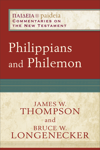
Overview
New in the Acclaimed Paideia Commentary Series
Two respected senior New Testament scholars examine cultural context and theological meaning in Philippians and Philemon in this addition to the well-received Paideia series. Paideia commentaries explore how New Testament texts form Christian readers by attending to the ancient narrative and rhetorical strategies the text employs, showing how the text shapes theological convictions and moral habits, and making judicious use of maps, photos, and sidebars in a reader-friendly format. Students, pastors, and other readers will appreciate the historical, literary, and theological insight offered in this practical commentary.
Two respected senior New Testament scholars examine cultural context and theological meaning in Philippians and Philemon in this addition to the well-received Paideia series. Paideia commentaries explore how New Testament texts form Christian readers by attending to the ancient narrative and rhetorical strategies the text employs, showing how the text shapes theological convictions and moral habits, and making judicious use of maps, photos, and sidebars in a reader-friendly format. Students, pastors, and other readers will appreciate the historical, literary, and theological insight offered in this practical commentary.
Endorsements
"Thompson and Longenecker have produced a first-rate commentary for contemporary students. The authors provide a guide to larger scholarship but offer their own assessments based on scrupulously careful readings of the text. The theological comments offer a model of how careful readings of these texts can and cannot be used in discussions of contemporary issues. I recommend it enthusiastically for students and ministers who are serious about the biblical text."
Gregory E. Sterling, Lillian Claus Professor of New Testament, Yale Divinity School
"Thompson and Longenecker are two seasoned scholars who have added a worthy contribution to the distinguished collection of commentaries in the Paideia series. Paul's letters to the Philippians and to Philemon, so different and yet related, are thought through carefully, with the many alternate interpretations sifted and weighed and with theological implications for today thoughtfully presented."
Carolyn Osiek, Charles Fischer Professor of New Testament emerita, Brite Divinity School, Texas Christian University
"With informed imagination and exegetical skill, Thompson and Longenecker open up two of Paul's most personal and engaging letters. With attention to Paul's scriptural, rhetorical, and cultural resources, they take us deep into Paul's faith and thought-world in ways that show the creative power of the gospel. The commentaries are enriched by engagement with biblical scholarship ancient and modern. The interweaving of Christian theological reflection with the authors' own wisdom opens the way for the essential next step in reading Scripture: contemporary appropriation. Highly recommended!"
Stephen C. Barton, department of theology and religion, Durham University
"Paul's letters to the Philippians and Philemon combined are just five chapters in length but are incredibly rich in theological content as well as socio-historical and hermeneutical complexity. Interpreters of Paul can thus rejoice that Thompson and Longenecker have expounded these two epistles with admirable exegetical skill, theological sensitivity, and enviable clarity. Highly recommended."
John T. Fitzgerald, professor of New Testament and early Christianity, University of Notre Dame
"Quality commentators both raise and respond to questions spawned by a careful reading of the text; quality commentaries both whet and sate readers' appetites with respect to such questions. Philippians and Philemon is a quality commentary composed by quality commentators. Thompson and Longenecker are to be congratulated for making these two beloved Pauline letters more understandable and, as a result, even more meaningful. I encourage readers of this valuable volume not just to dip into but to dive into the latest work of these skilled senior scholars."
Todd D. Still, DeLancey Dean & Hinson Professor, Truett Seminary, Baylor University
"Thompson and Longenecker transport their readers to a Roman colony in northern Greece and to the household of an ancient slaveholder, allowing us to discern what Christian converts in those environments would have heard in Paul's brief but influential letters of exhortation. The commentary employs rhetorical analysis to good effect in clarifying the argument of the letters and also identifies theological issues of continuing concern. The introductions and paragraph-by-paragraph commentary are informed by current scholarship but keep the text of the letters clearly in focus. Those seeking a companion to reading Paul's letters to the Philippians and Philemon will be well served by this addition to the Paideia series."
Jeffrey Peterson, Jack C. and Ruth Wright Professor of New Testament, Austin Graduate School of Theology
Authors
Bruce W. Longenecker
Bruce W. Longenecker (PhD, University of Durham) is the W. W. Melton Chair of Religion at Baylor University in Waco, Texas.
James W. Thompson
James W. Thompson (PhD, Vanderbilt University) is scholar in residence at the Graduate School of Theology at Abilene Christian University in Abilene, Texas. He is the editor of Restoration Quarterly and the author of numerous books, including Moral Formation according to Paul, Pastoral Ministry according to Paul, The Church according to Paul, and Hebrews in the Paideia commentary series.